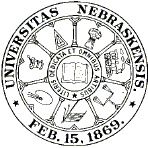
University Studies (University of Nebraska) (1888–1984)
Date of this Version
1923
Citation
UNIVERSITY STUDIES VOL. XXIII JANUARY-APRIL 1923 Nos. 1-2
Abstract
CHAPTER I • The Statehood Movement • The territorial system of the United States • The statehood movement in Dakota • The statehood movement in Washington, Idaho, Montana, and Wyoming • The Omnibus Bill • The Remaining Territories • The Constitutional Conventions • The Reform Movement
CHAPTER II • The Departments of Government • The Fixity of American Constitutions • Constitutions as historical sources • The Legislature • General dissatisfaction with the lawmaking body • The "Dakota plan" • The single chamber legislature • Size of the legislature • Basis of representation • Minority representation • Re-appointment • Popular control of the law-making body • Curtailment of legislative prerogative • Legislation in the constitution • Anti-corruption provisions • The Executive • Influence of the governor in law-making • Restrictions on the power of the governor • Appointive officials • Distrust of the executive • The Judiciary • Faults of the territorial judiciary • The independent supreme court • The political aspirations of judges eliminated • Attempts to secure an appointive judiciary • The supreme court required to pass on the constitutionality of proposed laws • Decline of the grand jury system • The unanimous verdict abolished • Meaning of the attack on the three original departments
CHAPTER III • Education and school lands • The connection between education and good government • Expansion of the state school system • Federal grants in aid of education • The Dakota agitation for a ten dollar minimum on sales of school lands • Land grants to the new states • Demand for the permanent retention of school lands by the state • Arguments against the renting of state lands • Need of aid in starting the school systems of the new states • Opportunities which the lands offered to increase the population of the state • The South Dakota article on school lands • The permanent fund • Certain lands reserved from sale • Appraisal and sale • "Squatter's Rights" • The credit system • Loans from the school fund on real estate • Success of this "legislation in the constitution"
CHAPTER IV • Corporations other than Municipal • Importance of the corporation problem • Popular belief in the necessity of regulation • Attempt of the conventions to deal with the corporations by constitutional provisions • Certain matters settled by past experiences • "Minority representation " in the voting of stock • "Stock watering " • The problem of the foreign corporation • Monopolies and "trusts" • Banks • Common carriers • Right of the legislature to fix transportation rates • Railway Commission • Efforts at the restoration of competition • Defence of consolidation • Discriminatory practices forbidden • Eminent domain • Free passes • Futility of state attempts at the regulation of inter-state business
CHAPTER V • Labor and social legislation • Why labor provisions were included • State supervision of labor conditions • Labor in mines • Woman and child labor • The eight hour day • Employer's liability • Blacklists • "Pinkertons" • Courts for the arbitration of labor disputes • Prohibition • Other social legislation •
CHAPTER VI • Taxation and public finance • Limitations upon state indebtedness • Limitations upon local indebtedness • Provisions against loaning the credit of the state • Limitations upon yearly expenditures and taxation • The taxation of mortgages and evidences of indebtedness • Influence of the single tax theory • Exemptions of church property • The taxation of corporations • The gross earnings tax for railroads • The taxation of mines
CHAPTER VII Miscellaneous • Elective officials • The suffrage • Woman suffrage • Alien voters • Property and educational qualifications • The Mormon question in ·Idaho • Elections • The Australian ballot • Other methods of preventing fraud • Local government • Irrigation and Water Rights • The doctrine of priority rights • Water the property of the state • Advanced position of the Wyoming convention • Eminent domain • Amendment
CHAPTER VIII Admission • The constitutions ratified • Formal admission • Press comment • The West as the stronghold of nationalism • Frontier influences in the conventions • The constitutions as documents in evidence of • American nationalization • The "Administrative" department
BIBLIOGRAPHY

